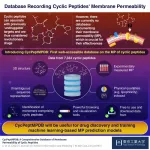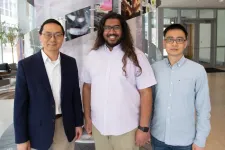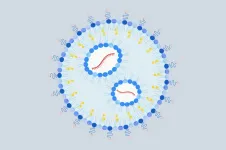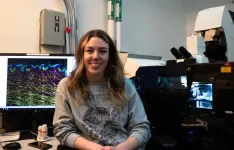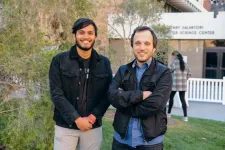(Press-News.org) In a new study published in The FASEB Journal, investigators demonstrated the potential of a molecule that may help overcome some of the devastating symptoms of Duchenne muscular dystrophy (DMD), the most common life-limiting congenital neuromuscular disorder. The agent promotes the activity of AMP-activated protein kinase (AMPK), an important fuel-sensing enzyme that is present in all mammalian cells.
Previous research has shown that stimulating AMPK can mitigate the dystrophy—or wasting—of muscles, but AMPK activators have failed to reach the clinic due to either their lack of potency or toxic off-target effects.
In this latest work, scientists utilized a next generation oral AMPK agonist called MK-8722 and showed that when given as a single dose to mice with muscular dystrophy, it triggered signaling pathways associated with improved muscle health.
Additional studies are needed to test the chronic administration of such next-generation AMPK activators in dystrophic animals to further examine their safety and effectiveness.
“Our work highlights the therapeutic potential of this novel class of AMPK activators in DMD, as well as in other neuromuscular diseases,” said lead author Sean Ng, MSc, PhD candidate, of McMaster University, in Canada. “We hope that these findings can be extended to other novel AMPK agonists that are currently being investigated in ongoing clinical trials. If so, repositioning these therapies may pose as a cost-effective and efficacious method for the treatment of DMD regardless of the specific disease-causing mutation.”
URL upon publication: https://onlinelibrary.wiley.com/doi/10.1096/fj.202201846RR
Additional Information
NOTE: The information contained in this release is protected by copyright. Please include journal attribution in all coverage. For more information or to obtain a PDF of any study, please contact: Sara Henning-Stout, newsroom@wiley.com.
About the Journal
The FASEB Journal publishes high quality and impactful multidisciplinary research covering biology and biomedical sciences at every level of organization: atomic, molecular, cell, tissue, organ, organismic, and population. The journal’s scope includes the spectrum of biological and biomedical sciences as well as interdisciplinary research cutting across multiple fields and extending in related areas.
About Wiley
Wiley is one of the world’s largest publishers and a global leader in scientific research and career-connected education. Founded in 1807, Wiley enables discovery, powers education, and shapes workforces. Through its industry-leading content, digital platforms, and knowledge networks, the company delivers on its timeless mission to unlock human potential. Visit us at Wiley.com. Follow us on Facebook, Twitter, LinkedIn and Instagram.
END
Could a novel small molecule slow or reverse the effects of Duchenne muscular dystrophy?
2023-04-05
ELSE PRESS RELEASES FROM THIS DATE:
CycPeptMPDB: A database aimed at promoting drug design using cyclic peptides
2023-04-05
CycPeptMPDB, a novel database—created by Tokyo Tech researchers—focused on the membrane permeability of cyclic peptides, could accelerate the development of drugs based on these promising compounds. This database was created by gathering published information on thousands of cyclic peptides and organizing it neatly in an online-accessible platform. Thanks to its search and visualization capabilities, CycPeptMPDB could pave the way to new computational and machine learning methods for screening and designing drugs with cyclic peptides.
One of the ...
Brain injury toolkit helps support domestic violence survivors
2023-04-05
COLUMBUS, Ohio – A new approach to trauma-informed care developed by domestic violence survivor advocates and researchers at The Ohio State University has been found in a new study to improve support organizations’ care for survivors by better recognizing brain injury and addressing its often long-lasting repercussions.
The study appears in the Journal of Head Trauma and Rehabilitation.
CARE is the first trauma-informed approach that considers brain injury in the complex set of circumstances to be addressed and accommodated in order ...
Aging at AACR Annual Meeting 2023
2023-04-05
Impact Journals (Aging's publisher) is proud to participate at the American Association for Cancer Research (AACR) Annual Meeting 2023, which convenes April 14-19 in Orlando, Florida.
BUFFALO, NY-April 4, 2023 – Impact Journals will be participating as an exhibitor at the American Association for Cancer Research (AACR) Annual Meeting 2023 from April 14-19 at the Orange County Convention Center in Orlando, Florida. This year, the AACR meeting theme is: “Advancing the Frontiers of Cancer Science and Medicine.”
Impact ...
A cold-specialized icefish species underwent major genetic changes as it migrated to temperate waters, new study finds
2023-04-05
Many animals have evolved to tolerate extreme environments, including being able to survive crushing pressures of ocean trenches, unforgiving heat of deserts, and limited oxygen high in the mountains. These animals are often highly specialized to live in these specific environments, limiting them from moving to new locations. Yet, there are rare examples of species that once lived in harsh environments but have since colonized more temperate settings. Angel Rivera-Colón, a former graduate student now postdoc in the lab of Julian Catchen (CIS/GNDP), an associate professor in the department ...
Bacterial signaling across biofilm affected by surface structure
2023-04-05
Similar to how cells within human tissues communicate and function together as a whole, bacteria are also able to communicate with each other through chemical signals, a behavior known as quorum signaling (QS). These chemical signals spread through a biofilm that colonies of bacteria form after they reach a certain density, and are used to help the colonies scavenge food, as well as defend against threats, like antibiotics.
“QS helps them to build infrastructure around them, like a city,” ...
Researchers discover new class of ribosomal peptide with hemolytic activity
2023-04-05
Living organisms produce a myriad of natural products which can be used in modern medicine and therapeutics. Bacteria and other microbes have become the main source for natural products, including a growing family called ribosomally synthesized and post-translationally modified peptides, or RiPPs. The labs of Douglas Mitchell (MMG), John and Margaret Witt Professor of Chemistry, and Huimin Zhao (CABBI/BSD/GSE/MMG), Steven L. Miller Chair of Chemical and Biomolecular Engineering, at the University of Illinois Urbana-Champaign have been working in tandem to identify and analyze new RiPPs that could be good candidates ...
Nanoparticle with mRNA appears to prevent, treat peanut allergies in mice
2023-04-05
Peanut allergies affect 1 in 50 children, and the most severe cases lead to a potentially deadly immune reaction called anaphylactic shock.
Currently, there is only one approved treatment that reduces the severity of the allergic reaction, and it takes months to kick in. A group of UCLA immunologists is aiming to change that.
Taking inspiration from COVID-19 vaccines as well as their own research on the disease, they created a first-of-its-kind nanoparticle — so small it’s measured in billionths of a meter — that delivers mRNA to specific cells in the liver. Those cells, in turn, teach the body’s natural defenses to tolerate ...
5 Questions with CNSI’s Haley Marks
2023-04-05
Haley Marks is a project scientist for the Advanced Light Microscopy Lab (ALMS) at the CNSI at UCLA. She is a biomedical engineer with a specialty in nano-biosensor research, translational medicine, and optics education.
Since joining CNSI in 2022, Haley has served as a technical expert, providing advanced light microscopy training and services to ALMS users. Here she works on developing and optimizing ALMS’s existing super-resolution and high-speed optical methods, developing strategies and imaging tools for in vivo imaging, and optimizing and disseminating computational imaging techniques.
Haley has a passion for all things photonics, and enjoys 3D printing, materials ...
Young dog owners tend to cope well when their beloved pooch misbehaves, new study reveals
2023-04-05
A new study published in the CABI journal Human-Animal Interactions reveals that young dog owners tend to cope well when their beloved pooch misbehaves.
Past studies suggest that around 90% of dogs display undesired behaviours such as aggression and disobedience, but little is known about the impact of this on young people’s experiences and accompanying emotions.
A team of scientists interviewed young dog owners in Canada, aged 17 to 26 years, to try and determine their experiences with their pets and their coping strategies in response to bad behaviour.
This included barking occasional and persistent barking and, in extreme cases, being aggressive towards other dogs ...
Robots predict human intention for faster builds
2023-04-05
Humans have a way of understandings others’ goals, desires and beliefs, a crucial skill that allows us to anticipate people’s actions. Taking bread out of the toaster? You’ll need a plate. Sweeping up leaves? I’ll grab the green trash can.
This skill, often referred to as “theory of mind,” comes easily to us as humans, but is still challenging for robots. But, if robots are to become truly collaborative helpers in manufacturing and in everyday life, they need to learn the same abilities.
In ...
